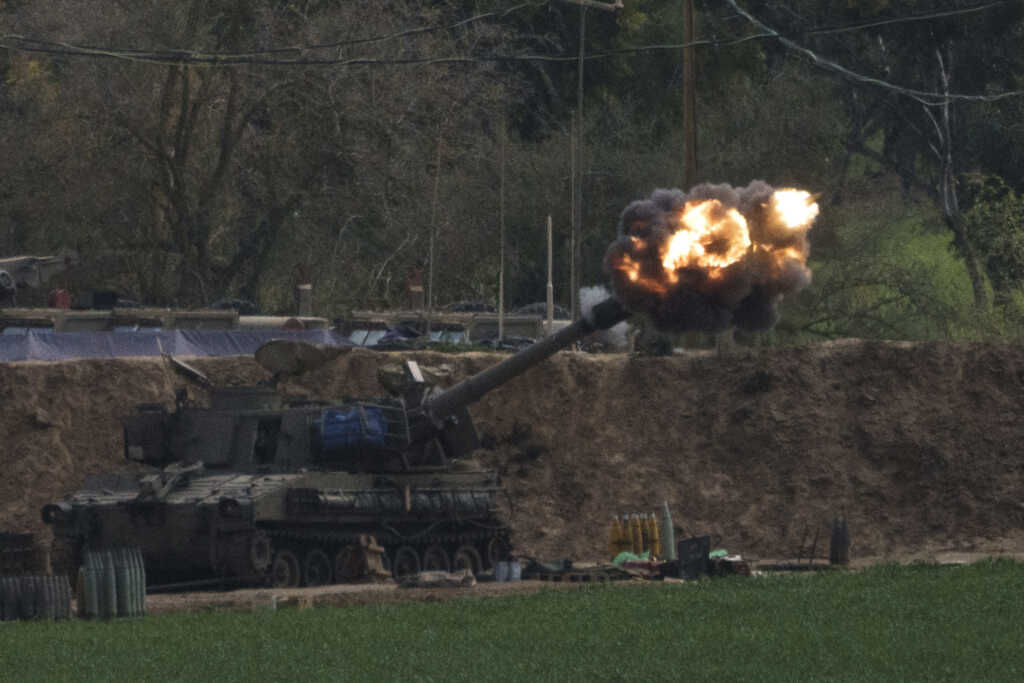A foreign policy analyst and ex-Israel Defense Forces paratrooper is offering some important warnings to world leaders who are increasingly pressuring Israel over the ongoing Gaza war, while also warning about the dangerous powder keg brewing on Israel’s northern border.
Listen to them on the latest episode of “Quick Start” 👇
Daniel Flesch said Israel’s current battle against Hamas is the “longest war for Israel since its war of independence” in the late 1940s — a struggle sparked by Hamas’ Oct. 7 terror attack that killed around 1,200 innocent Israelis.
With U.S. President Joe Biden and other world leaders beginning to put pressure on Israel to amend war operations, Flesch said it’s essential world leaders understand to whom they’re communicating.
“When you start putting pressure on Israel to take certain steps and how it conducts this operation, you have to consider the audience, and the audience is not just Israel,” he said. “A lot of it from this [Biden] administration is obviously their constituents … their voters.”
Flesch continued, “But also, Hamas is watching, other bad actors in the world are watching, and so Hamas has been rejecting ceasefire deals left and right.”
Watch him explain:
Flesch believes the terror group is likely assuming they have the Biden administration on their side, seeing the U.S. government as “putting pressure on Israel” and not pressing Hamas.
Rhetoric from world leaders, he argued, is thus deeply important.
Biden reportedly warned Israeli Prime Minister Benjamin Netanyahu that Israel must do more on the humanitarian front or risk the U.S. changing its policies on the matter. The president also pressed for an “immediate ceasefire.”
Israel has repeatedly made it clear the nation is no longer interested in being surrounded by terrorists bent on its destruction, with Oct. 7 proving to be a day validating fears of violent incursion.
While some have questioned Israel’s war strategy, Flesch said the Israeli government has three clear objectives — and the first of which is bringing home the hostages still being held by Hamas.
“The second objective is to dismantle the Hamas political and military infrastructure in Gaza,” he added, explaining the central objective is to render Hamas “unable to perpetrate an October 7th invasion and massacre again.”
Flesch said the third objective is to restore overarching security to Israelis — something that was shattered during the October attack. Considering Israel is intended to be a place of “refuge and security for the Jewish people,” he said the ramifications for what happens next are massive.
“This is a war for Israeli survival,” Flesch said. “Israelis, in many ways, are fighting a second war of independence, because, if Hamas is able to perpetrate October 7th and Israel’s unable to then destroy Hamas — which again means essentially not allowing it to restore its political military capabilities in the Gaza Strip — then, essentially, that means … anybody can actually attack the Jewish state, because they’re the Jewish state and get away with it.”
But Flesch also argued that the current dynamic — and dangers — go well beyond Israel’s borders. He said there’s a “new Cold War” brewing, one that isn’t focused solely on Russia (the former Soviet Union).
“There’s a growing axis out there between Russia, Iran, and China — an axis of resistance,” he said. “Actually, Iran calls its proxy network in the Middle East the Axis of Resistance, but these three countries are working in concert to push back against the Western, U.S.-led liberal order.”
Despite not sharing the same ideology, Flesch said these nations have a common goal of fighting back against the West and America. The Israel fight, he said, is just one battle in that war, imploring the U.S. to take the allies’ side.
It’s a war that could kick up into high gear, especially if issues persist on Israel’s northern border. During Flesch’s own military service, he said he served on the Lebanese border and that, at the time from 2010 to 2012, it was a “very quiet border.”
Flash forward to 2024, and the situation is quite different.
“Right now, the threat from the north is much more significant than the threat from Hamas ever was,” Flesch said. “Because Hezbollah in the north possesses between 150 and 200,000 rockets and missiles, many of which can strike throughout Israel, and about 90 percent of Israel’s population and industrial capacity is in the center of the country.”
A war from the north could hypothetically be far more detrimental and dangerous to Israel’s survival than anything else we’ve seen thus far concerning Hamas, he said. Already, many Israelis have been forced to flee their homes and communities, with tensions rising.
“Israeli citizens, civilians who’ve been evacuated from the northern communities,” Flesch said. “How can you live in a country where you can’t go to your home?”
Watch Flesch break down all that’s at stake.
***As the number of voices facing big-tech censorship continues to grow, please sign up for Faithwire’s daily newsletter and download the CBN News app, developed by our parent company, to stay up-to-date with the latest news from a distinctly Christian perspective.***



